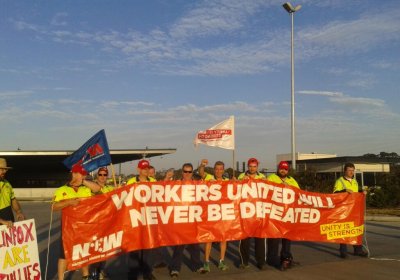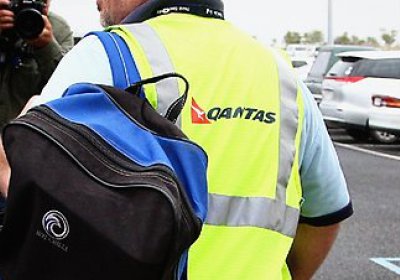Every day at 5.30am, residents and supporters gather in the Collingwood area around Alexandra Parade to protest against test drilling for the government's proposed East-West Link tollway tunnel.
Keith Fitzgerald stands to lose the house he has lived in for 69 years if the tunnel is built. He told Green Left Weekly the protests are about more than just his home.
“They've got no right to take our heritage, our history, our parks and our clean air away from us. These are the vital things that we're fighting for and will continue to fight for.
Ben Courtice
About 400 members of the National Union of Workers took a day's strike action on January 17, with a picket line at the Coles/Linfox warehouse facility in Truganina, on the western fringe of Melbourne.
The strike action was in support of the union's demand for a site agreement, something other Coles warehouses have. The workers are asking for a range of improvements in conditions, including an extra paid rest break per shift and a fair pay rise.
NUW delegate Mathew Davies told Green Left that the workers are demanding “fair pay for everyone.”
After negotiating for 16 months, the Ambulance Employees Australia in Victoria say they are not much closer to securing a contract that gives them the pay levels they are seeking and protects the quality of their service to the public.
On December 4, the union rejected the latest offer from the state government for a 12% pay rise over the next three years.
Gelliondale Resources, a subsidiary of Melbourne company Ignite Energy Resources Limited, have applied for a “retention licence” for a project to mine brown coal at Gelliondale, in the South Gippsland region.
The application includes a work program of “field exploration activities such as drilling, sampling, excavation of costeans or pits and surveying,” according to the company website.
Australian environmentalists welcomed the October announcement that mining giant BHP was abandoning its plans for a coal export rail and port development at Abbot Point in Queensland.
However, the company is simultaneously involved in a giant new coal export development on Kalimantan in Indonesia.
A Melbourne woman has taken to living in a treehouse suspended from a tall mountain ash in the Toolangi area north-east of Melbourne, to highlight loss of Victoria's native forest and the critically endangered Leadbeater's possum.
Hannah Patchett told community radio 3CR that she decided to take the action because “a lot of people didn't even know where Toolangi was, let alone that there was clearfell logging happening in Leadbeater habitat.
Qantas has announced the closure of its maintenance base for Boeing 747 aircraft at Avalon airport in Victoria. About 300 workers are to be sacked, most of them from the local town of Geelong.
The Australian Licensed Aircraft Engineers Association has questioned company claims that the jobs will be transferred to the more efficient Brisbane maintenance base, suggesting that a shortage of skilled workers in Brisbane will mean the maintenance is mainly done offshore in south-east Asia.
These job losses add to a long string of bad news for employment in Geelong.
It's long been a favoured wish of many environmentalists to go off the grid, to be self-sufficient in energy and other services, and avoid the corporate utilities and their coal-powered electricity. The ambition for freedom from energy bills and fossil-fuel electricity is understandable.
And now in the age of relatively cheap solar panels (which weren't around in the 1970s), you can live off the grid and use a huge battery attached to a large array of solar PV (photovoltaic) panels, to maintain a hi-tech lifestyle on clean solar energy.
In the same boat
Channa Wickremesekera
Bay Owl Press, 2010
It almost seems superfluous to review this book. At a mere 62 pages, it is barely a novella — a short story, perhaps. Why not just read the book, and skip the review?
Once you start, if it's going to appeal to you at all, the first few pages will draw you in and you will finish it in the same sitting.
A protest against using the Victorian port of Hastings for brown coal exports attracted 200 people on November 9, including locals and community members from across Gippsland.
Several coal export projects are seeking to use land at Hastings in Western Port, south-east of Melbourne, for a one-square-kilometre brown coal drying facility and port.
About 200 residents blockaded Somerville Road during morning rush hour in the inner-west Melbourne suburb of Kingsville on November 12 to protest against the number of container trucks using the street.
Somerville Road is a two-lane residential road that carries 3000 trucks a day. There are three primary schools and a kindergarten nearby with 1500 children enrolled.
The protest was organised by Maribyrnong Truck Action Group (MTAG) and heard from Maribyrnong Mayor Grant Miles, MTAG president Samantha McArthur, and Merryn Redenbach from Doctors for the Environment.
Unionists at the Woolworths warehouse in Barnawartha, northern Victoria, have won an 8.3% wage rise and other benefits after an eight-day strike that ended on November 1.
The 350 members of the National Union of Workers (NUW) went on strike on October 25 due to pay rates much lower than Melbourne employees doing the same job. A NUW statement said management had offered a raise of 74¢ per hour for Barnawartha workers, compared to $1.04 for Melbourne employees.
Members at the Barnawartha warehouse already earned $203 a week less than workers in Melbourne.
- Previous page
- Page 5
- Next page








